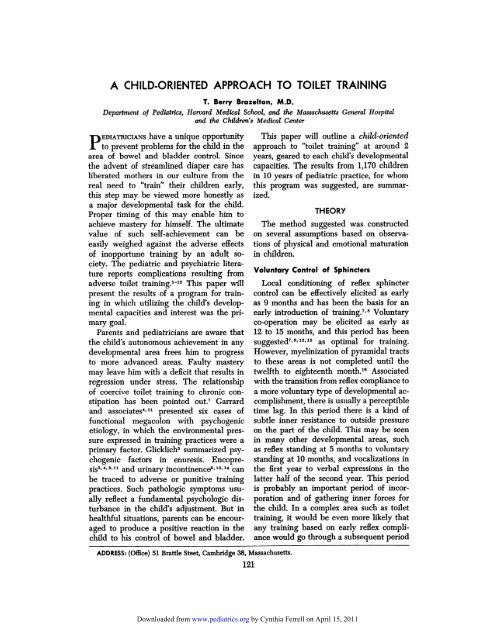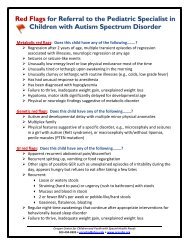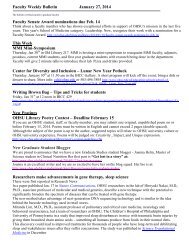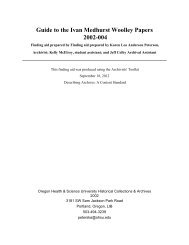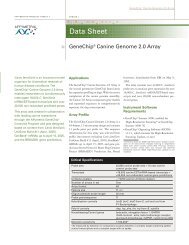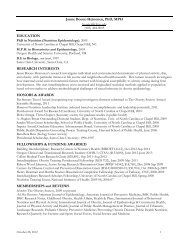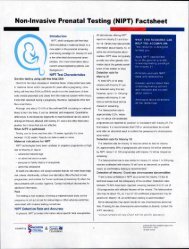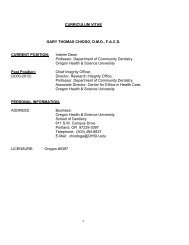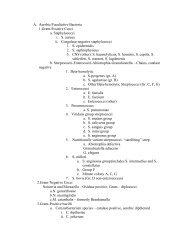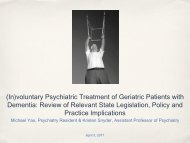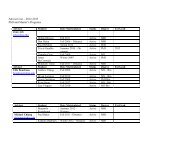1962;29;121-128 Pediatrics T. Berry Brazelton A CHILD-ORIENTED ...
1962;29;121-128 Pediatrics T. Berry Brazelton A CHILD-ORIENTED ...
1962;29;121-128 Pediatrics T. Berry Brazelton A CHILD-ORIENTED ...
Create successful ePaper yourself
Turn your PDF publications into a flip-book with our unique Google optimized e-Paper software.
A <strong>CHILD</strong>-<strong>ORIENTED</strong>APPROACH TO TOILET TRAINING<br />
T. <strong>Berry</strong> <strong>Brazelton</strong>, M.D.<br />
Department of <strong>Pediatrics</strong>, Harvard Medical School, and the Massachusetts General Hospital<br />
and the Children's Medical Center<br />
P EDIATRICIANShave a unique opportunity<br />
to prevent problems for the child in the<br />
area of bowel and bladder control. Since<br />
the advent of streamlined diaper care has<br />
liberated mothers in our culture from the<br />
real need to “¿train†their children early,<br />
this step may be viewed more honestly as<br />
a major developmental task for the child.<br />
Proper timing of this may enable him to<br />
achieve mastery for himself. The ultimate<br />
value of such self-achievement can be<br />
easily weighed against the adverse effects<br />
of inopportune training by an adult so<br />
ciety. The pediatric and psychiatric litera<br />
hire reports complications resulting from<br />
adverse toilet training.1'2 This paper will<br />
present the results of a program for train<br />
ing in which utilizing the child's develop<br />
mental capacities and interest was the pri<br />
mary goal.<br />
Parents and pediatricians are aware that<br />
the child's autonomous achievement in any<br />
developmental area frees him to progress<br />
to more advanced areas. Faulty mastery<br />
may leave him with a deficit that results in<br />
regression under stress. The relationship<br />
of coercive toilet training to chronic con<br />
stipation has been pointed out.7 Garrard<br />
and 411 presented six cases of<br />
functional megacolon with psychogenic<br />
etiology, in which the environmental pres<br />
sure expressed in training practices were a<br />
primary factor. Glicklich5 summarized psy<br />
chogenic factors in enuresis. Encopre<br />
sis2'4'9'1' and urinary incontinenc&â€3'14 can<br />
be traced to adverse or punitive training<br />
practices. Such pathologic symptoms usu<br />
ally reflect a fundamental psychologic dis<br />
turbance in the child's adjustment. But in<br />
healthful situations, parents can be encour<br />
aged to produce a positive reaction in the<br />
child to his control of bowel and bladder.<br />
This paper will outline a child-oriented<br />
approach to “¿toilet training†at around 2<br />
years, geared to each child's developmental<br />
capacities. The results from 1,170 children<br />
in 10 years of pediatric practice, for whom<br />
this<br />
ized.<br />
program was suggested, are summar<br />
THEORY<br />
The method suggested was constructed<br />
on several assumptions based on observa<br />
tions of physical and emotional maturation<br />
in children.<br />
Voluntary Control of Sphincters<br />
Local conditioning of reflex sphincter<br />
control can be effectively elicited as early<br />
as 9 months and has been the basis for an<br />
early introduction of<br />
co-operation may be elicited as early as<br />
12 to 15 months, and this period has been<br />
@ Voluntary<br />
ADDRESS: (Office) 51 Brattle Steet, Cambridge 38, Massachusetts.<br />
<strong>121</strong><br />
79, 12, 15 as optimal for training.<br />
However, myelinization of pyramidal tracts<br />
to these areas is not completed until the<br />
twelfth to eighteenth month.16 Associated<br />
with the transition from reflex compliance to<br />
a more voluntary type of developmental ac<br />
complishment, there is usually a perceptible<br />
time lag. In this period there is a kind of<br />
subtle inner resistance to outside pressure<br />
on the part of the child. This may be seen<br />
in many other developmental areas, such<br />
as reflex standing at 5 months to voluntary<br />
standing at 10 months, and vocalizations in<br />
the first year to verbal expressions in the<br />
latter half of the second year. This period<br />
is probably an important period of incor<br />
poration and of gathering inner forces for<br />
the child. In a complex area such as toilet<br />
training, it would be even more likely that<br />
any training based on early reflex compli<br />
ance would go through a subsequent period<br />
Downloaded from<br />
www.pediatrics.org by Cynthia Ferrell on April 15, 2011


